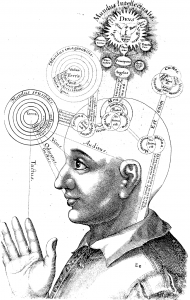 Many religious or spiritual systems dealing with mystical experiences have a concept of gnosis. It is contrasted with rational knowledge in that it is based on a personal and usually profound experience, and is set apart from faith in that it doesn’t appeal to a sense of acceptance or emotional argument.1 Gnosis is a Greek word, γνῶσις, and while it translates as “knowledge,” it is not the only Greek word to do so. To understand what it means, it needs to be compared to two other words with similar meanings, epistēmē (ἐπιστήμη) and pistis (πίστις).
Many religious or spiritual systems dealing with mystical experiences have a concept of gnosis. It is contrasted with rational knowledge in that it is based on a personal and usually profound experience, and is set apart from faith in that it doesn’t appeal to a sense of acceptance or emotional argument.1 Gnosis is a Greek word, γνῶσις, and while it translates as “knowledge,” it is not the only Greek word to do so. To understand what it means, it needs to be compared to two other words with similar meanings, epistēmē (ἐπιστήμη) and pistis (πίστις).
Two Types of Knowledge
While epistēmē indicates general knowledge, gnosis indicates knowledge that is personal. Epistēmē is rational knowledge formed from empirical observation or reasoning, the knowledge of a doubting mind attempting to make sense of the world around it. When knowledge falls in this category, it is of the sort that is useful and agreed-upon by everybody capable of comprehending it. Gnosis, however, is based on a personal experience. John Michael Greer writes this about gnosis:
[Gnosis] is not a matter of ordinary learning but a personal experience of spiritual truth. The Gnostic is not interested in belief; he or she wants to know, directly and personally, the spiritual realities of the cosmos.2
Gnosis and Faith
Pistis is the Greek word for faith. While gnosis is similar to faith, there is an important difference. Faith can be defined by dogma, and is primarily intellectual and emotional in character. Gnosis, on the other hand, is defined by personal insight, and is spiritual and critically experiential in character. While you might feel faith, you experience gnosis.3
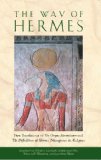 Hermeticism, like Christian Gnosticism, is concerned with the experience of gnosis. Hermes Trismegistus tries to describe the gnostic experience several times throughout the Corpus Hermeticum. For example:
Hermeticism, like Christian Gnosticism, is concerned with the experience of gnosis. Hermes Trismegistus tries to describe the gnostic experience several times throughout the Corpus Hermeticum. For example:
I have only this to tell: I see within me a formless vision born by the mercy of God. I have come out of my former self into an immortal body. I am not now what I was before. For I have been born in Nous. Such a thing is not taught, nor can it be seen by the physical body.
Corpus Hermeticum XIII.34
Personal and Experiential
To put it simply, gnosis is knowledge that comes from a direct mystical experience. It cannot be passed along to another person like knowledge of mathematics or history. It also cannot come through an emotional appeal to intellect, such as with religious conversion. Gnosis is knowledge that must be experienced to be received.
Did you like this article? My patrons receive new articles five days early. Support my work on Patreon!

Lachman, Gary. The Quest for Hermes Trismegistus: From Ancient Egypt to the Modern World. Floris Books, 2011. 23-7. ↩
Greer, John Michael. “Gnosticism.” In The New Encyclopedia of the Occult, 196. St. Paul, MN: Llewellyn Publications, 2003. ↩
Brons, David. “Faith (pistis) and Knowledge (gnosis).” The Gnostic Society Library – Valentinus and the Valentinian Tradition. Accessed March 21, 2016. http://www.gnosis.org/library/valentinus/Faith_Knowledge.htm. ↩
Salaman, Clement, trans. The Way of Hermes: Translations of The Corpus Hermeticum and the Definitions of Hermes Trismegistus to Asclepius. Rochester, VT: Inner Traditions, 2000. ↩


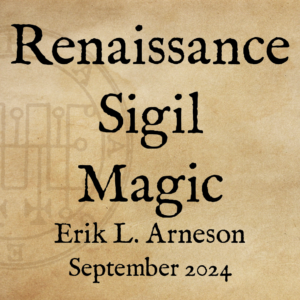
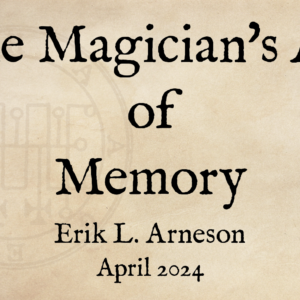
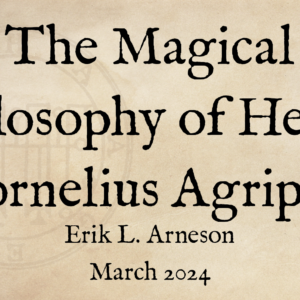
I like that your explanation differentiates between external experience and internal understanding. In this weeks lectionary (John 10:25) ἀπεκρίθη αὐτοῖς ὁ Ἰησοῦς· εἶπον ὑμῖν καὶ οὐ πιστεύετε· τὰ ἔργα ἃ ἐγὼ ποιῶ ἐν τῷ ὀνόματι τοῦ πατρός μου ταῦτα μαρτυρεῖ περὶ ἐμοῦ· ….makes me wonder what things people experienced that caused them to believe the things they did about Jesus. Anyhow, that is the art of translation, to try to figure out what the words meant to the people who wrote them.
[…] and unworthy of the divine. In this view, God is seen as apart from the cosmos, and the path to gnosis, or knowledge of God, comes from forsaking the material world and focusing on the spiritual.1 The […]
[…] his real meaning is to be determined by each of us individually. As Hermeticism focuses on the experience of gnosis, it could be that Hermes Trismegistus himself is a concept that needs to be personally experienced […]
[…] further. It is related to the Platonic concept of ideas and forms, and is reflected in early Christian Gnostic writings, as well. In my earlier article on the Emerald Tablet, I shared a quote from the Gospel of […]
[…] In the ensuing dialog, Tat receives God’s mercy and the ten powers, followed by a gnostic vision wherein he sees himself in the Nous of God. Presumably this leads to the creation of Tat’s […]
[…] However, Iamblichus also seems to blend together the mystical experience of theurgy with the practice of divination, sometimes seeming to imply that the practitioner of theurgy is privy to a more special type of knowledge.2 […]
[…] To put it simply, gnosis is knowledge that comes from a direct mystical experience. It cannot be passed along to another person like knowledge of mathematics or history. It also cannot come through an emotional appeal to intellect, such as with religious conversion. Gnosis is knowledge that must be experienced to be received. – ArneMancy […]